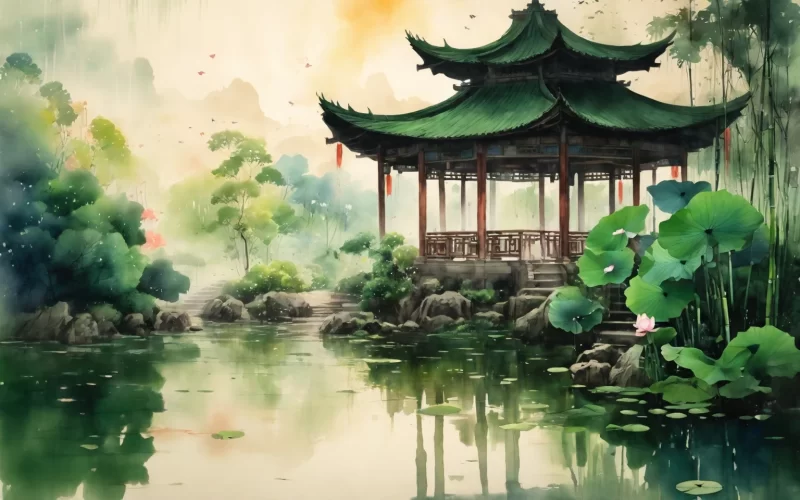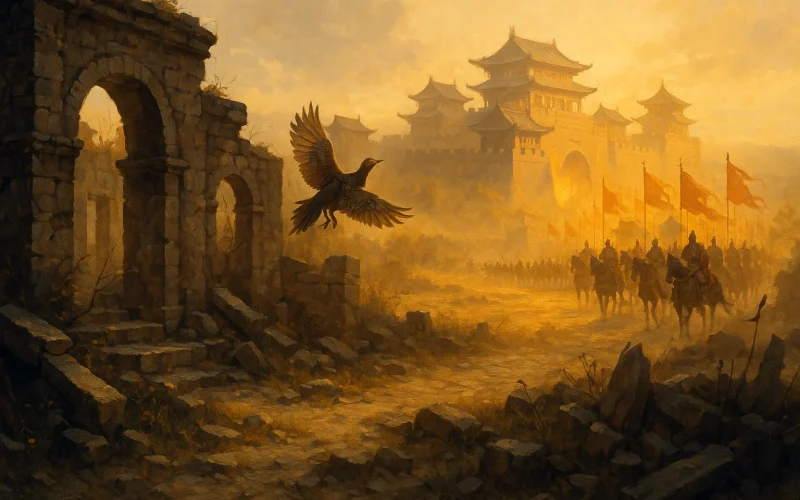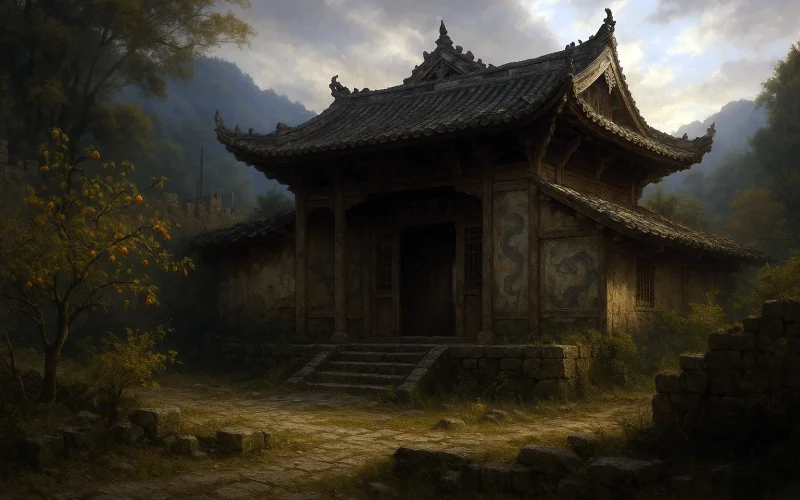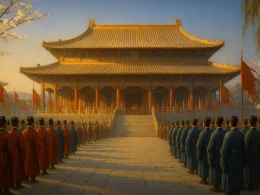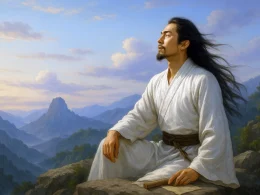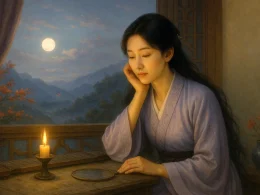Where the two poets parted,
The scene seems broken-hearted.
The moon's left in the sky;
The stream flows with deep sigh.
The pool reflects sunlight;
Bamboos shiver at night.
The present like the past;
Long, long will friendship last.
Original Poem
「谢公亭」
李白
谢亭离别处,风景每生愁。
客散青天月,山空碧水流。
池花春映日,窗竹夜鸣秋。
今古一相接,长歌怀旧游。
Interpretation
Composed during Li Bai's travels in Xuancheng, this poem pays homage to the Southern Qi poet Xie Tiao, who served as governor of Xuancheng and left numerous poetic legacies there, including the famed Xie Gong Pavilion. Li Bai deeply admired Xie Tiao, often referencing him as a soulmate across centuries. More than mere remembrance of an ancient worthy, this work represents a spiritual dialogue across time between two talents who shared similar fates (both faced envy for their brilliance), serving as an expression of Li Bai's own sentiments.
First Couplet: "谢亭离别处,风景每生愁。"
Xiè tíng líbié chù, fēngjǐng měi shēng chóu.
This Xie Pavilion, place of parting long ago; Its scenery ever stirs sorrow in me.
The opening establishes the theme and melancholic tone. "Place of parting" refers both to Xie Tiao's historical farewells and implies Li Bai's own experiences of wandering and separation. "Ever stirs sorrow" emphasizes this isn't momentary sentiment but a perpetual emotion triggered by each visit, revealing how historical memory overlaps with personal mood.
Second Couplet: "客散青天月,山空碧水流。"
Kè sàn qīngtiān yuè, shān kōng bì shuǐ liú.
Guests long dispersed, only the blue sky's moon remains; Mountains stand empty, emerald waters flow on.
This couplet employs minimalist artistry to starkly contrast eternal nature with transient human affairs. "Guests dispersed" and "mountains empty" evoke the void left by vanished activity, while "sky's moon" and "flowing waters" stand as detached, timeless witnesses. The imagery achieves ethereal clarity, creating a vast and distant artistic conception that captures the essence of Xie Tiao's landscape poetry—fresh, elegant, and subtly profound.
Third Couplet: "池花春映日,窗竹夜鸣秋。"
Chí huā chūn yìng rì, chuāng zhú yè míng qiū.
Pond flowers bask in spring sunlight; By the window, bamboos murmur in autumn nights.
Selecting iconic pavilion scenes, the poet uses parallel couplets to condense seasonal changes. "Spring sunlight" and "autumn murmurs" depict visual and auditory beauty while injecting a sense of time's passage into static space. The lovely scenery lacks someone to share it with—flowers bloom and fade, bamboos murmur alone, using joyful scenes to convey sorrow, intensifying the melancholy.
Fourth Couplet: "今古一相接,长歌怀旧游。"
Jīngǔ yī xiāngjiē, chánggē huáijiù yóu.
Past and present suddenly connect; I sing aloud, yearning for your past journeys.
The concluding couplet forms the poem's emotional climax, achieving a transcendent leap. "Suddenly connect" captures a spiritual epiphany and resonance that instantly shatters temporal boundaries. This connection transcends mournful nostalgia, representing instead a profound soulful communion and identification. "Singing aloud" becomes an emotional catharsis that embodies heroic spirit, concluding the poem on an uplifting note that resonates with lofty significance.
Holistic Appreciation
This poem exemplifies Li Bai's characteristic nostalgic structure: a physical site (Xie Pavilion) evokes natural imagery (landscape, moon, water), which awakens emotion (sorrow), culminating in philosophical insight (past-present connection) at the emotional climax. The language maintains freshness and naturalness, the parallelism demonstrates careful balance, while the artistic conception transitions from quiet solitude to expansive grandeur. Through remembering Xie Tiao, Li Bai simultaneously affirms and expresses his own aspirations and character, elevating a simple nostalgic visit into a profound dialogue between two great souls across centuries.
Artistic Merits
- Artful Interweaving of Time and Space: The poem skillfully juxtaposes historical time (Xie Tiao's parting) with present time (Li Bai's visit), connecting them through nature's permanence (moon, water, flowers, bamboos) to create profound historical resonance.
- Dynamic-Static Balance in Atmosphere: "Guests dispersed" and "mountains empty" convey stillness, while "flowing waters" and "murmuring bamboos" introduce movement, combining environmental serenity with living breath.
- Deep Lyricism through Scene-Emotion Fusion: Without direct emotional outbursts, every word carries feeling—sorrow, solitude, yearning, resonance—all permeating the scenery descriptions, subtle yet powerful.
- Uplifting Conclusion and Transcendence: Unlike typically gloomy nostalgia poem endings, Li Bai concludes with "singing aloud" and "connection," showing heroic abandon amid melancholy, reflecting High Tang poets' unique spiritual stature.
Insights
This poem profoundly reveals the meaning of "kindred spirit" in cultural transmission. True remembrance isn't wallowing in sadness or lamenting change, but achieving deep resonance with predecessors in the spiritual realm and drawing strength from it. Li Bai and Xie Tiao's "past-present connection" shows us that great spirit and art can transcend time's erosion, finding echoes across millennia. This enlightens us that in pursuing life's value, finding such spiritual soulmates—whether ancient or modern—brings immense comfort and strength, letting us feel spiritual companionship and civilizational continuity in our solitary explorations.
Poem translator
Xu Yuanchong(许渊冲)
About the poet

Li Bai (李白), 701 - 762 A.D., whose ancestral home was in Gansu, was preceded by Li Guang, a general of the Han Dynasty. Tang poetry is one of the brightest constellations in the history of Chinese literature, and one of the brightest stars is Li Bai.






